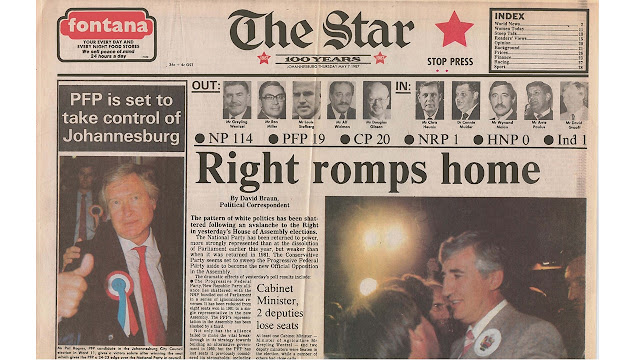Sunday, 17 May 1987: Right Wing Victory in South African Elections
U.B. Environmental
Science Computer Room
Because my visa to South Africa was not renewed, I was unable to get into the country for the 6 May elections. On the 7th, I went with Hugh to the Oasis Fitness Centre here in Gaborone for one of our regular work outs on the Universal Gym. Afterword, I stopped at his house for a few minutes before pedaling back to campus. “Have you seen the election results?” he inquired while handling me a copy of The Star (Johannesburg’s leading English-language paper). “Right Romps Home” read the headline and so they had. The big news: the Conservative Party had replaced the relatively liberal Progressive Federal Party as the official opposition. In other words, a party to the right of the ruling National Party had replaced a party to the left as the second strongest in Parliament. More than 75% of the votes went to National Party candidates or to those to their right.
I was stunned. I shouldn’t have been. After all the time I’d spent in South Africa,
I was still holding on to the illusion that the political situation there would
change for the better. Just how naïve am
I anyway?
Election results in the 7 May edition of The Star indicated that the Conservative
Party would now be the official opposition in Parliament with 20 seats to the
PFP’s 19. There was a glimmer of change in
the results from Johannesburg – the PFP would take control of its municipal
government.
Today, I attended a
brunch at David and Elizabeth’s home in Broadhurst, a couple miles north of the
campus. There were mostly Americans
present, and I had a conversation with John, a 25ish Peace Corps volunteer
originally from Houston who now calls Colorado home. John is a teacher in Ramotswa, a large
village about 20 miles south of here and the scene of a South African Army raid
on a suspected ANC hideout 5½ months ago on New Year’s Eve.
I asked John about the raid, and he told a story of how it had gotten him into some hot water. He’d been riding the train from Johannesburg to Mafikeng a couple days after the raid and was in a compartment with some South African soldiers. One of them forgot his hat when he got off, so John decided it would make a nice souvenir. He hitched a ride from Mafikeng to Ramotswa, but before arriving the car was stopped by a Botswana Defense Force road block. The BDF soldiers searched John’s bags and found the South African Army cap. He was taken in for questioning. The BDF brass bought his story after looking over his passport and Peace Corps papers, but they kept the hat saying it would just get him into more trouble later on.
That launched us into a discussion about South Africa. Contrary to what I’d heard from other sources, Peace Corps volunteers DO routinely get visas for South Africa. John said they need visas because they are often sent there for medical care.
He had been in Durban for Christmas and frequently visited Johannesburg where he had gotten to know a few people.
“Were you there around the time of the elections?” I asked.
“Before, during, and after.”
“Did you get a feel for the general mood of people regarding the elections?”
“Yes. See I like to shoot pool, so I frequently hang out in a pool hall in Hillbrow [a section of Johannesburg]. All kinds of guys come in there – from conservatives to UDF members [United Democratic Front – a coalition of some 400 organizations opposed to Apartheid]. A lot of the conversation was in Afrikaans, but I could tell they were talking politics.”
“They probably staged debates for you,” commented Kent, another American listening in on our conversation.
“How did they think the election was going to turn out?” I inquired.
“My liberal friends were optimistic, and they would say, ‘Wait until the next election in ’89. That’s when you’ll see some real change.’ [7/4/23 note: Turns out they were right. In 1989, F.W. de Klerk was elected President and it was he who released Nelson Mandela in 1990 and led the country to the first free elections in 1994.] Still, they were shocked by the results. One said, ‘Until now, if 100 blacks were shot by the police, the PFP opposition would get up in Parliament and say, “How could the police do such a terrible thing?” Now the Conservative opposition will get up and complain, “Why didn’t they shoot more?”’” John added that the government had successfully campaigned with scare tactics equating a vote for the PFP with a vote for the ANC.
John’s educational background is in construction management. I was surprised to learn that he’s thinking of getting a construction job in one of the homelands after he’s finished his two years with the Peace Corps. He noted that the South African government is pumping millions into homeland construction projects.
“Because you’ve traveled in South Africa, you probably know you’d be relatively safe there,” I noted. “Still, wouldn’t you find it depressing working there given the current political situation? …and I should add, the dismal prospects for positive change given the latest election results?”
John was more optimistic about South Africa’s future than I am. “I’ve met a lot of liberal people in South Africa who are working for change,” he said.
Maybe so, but John hasn’t spent any time out in the rural platteland rubbing elbows with the “Volk” like I have. Make no mistake, the laager is tightening up.




Comments
Post a Comment